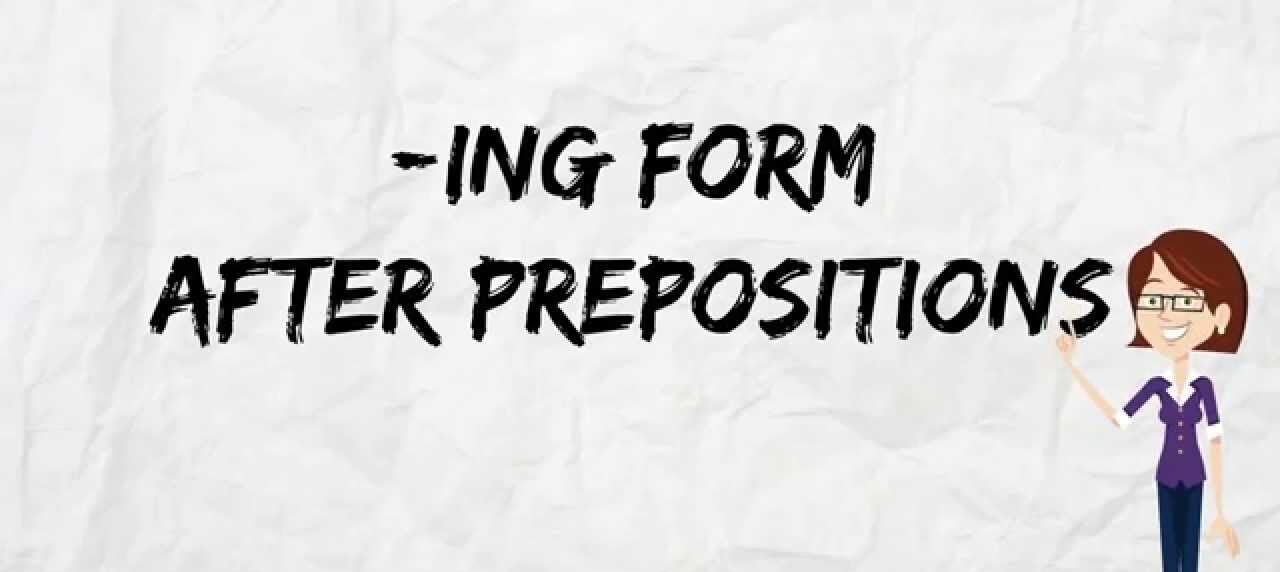Các giới từ theo sau là v-ing. Nếu chúng ta muốn sử dụng một động từ sau một giới từ, nó phải ở dạng -ing. Không thể sử dụng một nguyên thể sau một giới từ. Vậy, Các giới từ theo sau là v-ing là những giới từ nào? Cách dùng thế nào? sẽ được ngolongnd chia sẻ qua bài viết dưới đây.

Nội dung chính:
Cách dùng Ving sau giới từ
Ví dụ
- I will call you after arriving at the office.
notI will call after to arrive at the office. - Please have a drink before leaving.
- I am looking forward to meeting you.
- Do you object to working late?
- Tara always dreams about going on holiday.
Giới từ +Ving
after
After having a shower, I waited for Steven.
before
The tablet must not be taken before getting up in the morning.
by
I manage it by working much longer than 40-hour weeks.
in spite of
In spite of studying a lot he didn’t pass the exams.
on
What was her reaction on hearing the news?
without
He told the joke without laughing.
Adjective + Preposition + Ving
afraid of
They are afraid of losing the match.
angry about/at
Pat is angry about walking in the rain.
bad at/good at
John is good at working in the garden.
crazy about
The girl is crazy about playing tennis.
disappointed about/at
He is disappointed about seeing such a bad report.
excited about
We are excited about making our own film.
famous for
Sandy is famous for singing songs.
fed up with
I’m fed up with being treated as a child.
fond of
Hannah is fond of going to parties.
glad about
She is glad about getting married again.
happy about/at
The children are not happy about seeing a doctor.
interested in
Are you interested in writing poems?
keen on
Joe is keen on drawing.
proud of
She is proud of speaking English.
sick of
We’re sick of sitting around like this.
sorry about/for
He’s sorry for eating in the lesson.
tired of
I’m tired of waiting for you.
used to
She is used to smoking.
worried about
I’m worried about making mistakes.
Noun + Preposition + Ving
advantage of
What is the advantage of farming over hunting?
chance of
There’s a chance of catching a cold these days.
choice between
There’s a choice between flying to London Heathrow or Stansted.
danger of
Peggy is in danger of making a mistake.
difficulty in
He has difficulty in texting.
doubt about
He is in doubt about buying the correct software for his computer system.
hope of
There’s little hope of catching the new Corvette.
idea of
I like the idea of setting up a new email account.
interest in
There’s no interest in writing letters.
method of
This is a simple method of finding solutions.
opportunity of
There’s some opportunity of bringing her parents together again.
possibility of
These wheels offer the possibility of riding tubeless.
problem of
He has the problem of swimming too slow.
reason for
There’s a real reason for winning the contest.
risk of
There’s a risk of digging too deep.
trouble for
He was in trouble for stealing.
way of
This is a new way of building a wall.
Verb + Preposition + Ving
accuse of
They were accused of breaking into a shop.
agree with
I agree with playing darts.
apologize for
They apologize for being late.
believe in
She doesn’t believe in getting lost in the wood.
blame for
The reporter is blamed for writing bad stories.
complain about
She complains about bullying.
concentrate on
Do you concentrate on reading or writing?
congratulate sb. on
I wanted to congratulate you on making such a good speech.
cope with
He is not sure how to cope with getting older.
decide against
They decided against stealing the car.
depend on
Success may depend on becoming more patient.
dream about/of
Sue dreams of being a pop star.
feel like
They feel like going to bed.
get used to
You must get used to working long hours.
insist on
The girls insisted on going out with Mark.
look forward to
I’m looking forward to seeing you soon.
prevent sb. from sth.
How can I prevent Kate from working in this shop?
rely on sth.
He doesn’t rely on winning in the casino.
succeed in
How then can I succeed in studying chemistry?
specialize in
The firm specialized in designing websites.
stop sb. from
I stopped Andrew from smoking.
talk about/of
They often talk about travel(l)ing to New Zealand.
think about/of
Frank thinks of playing chess.
warn sb. against
We warned them against using this computer.
worry about
The patient worries about having the check-up.
Giới từ + Ving trong tiếng Anh
Nếu một giới từ (in/for/about/…) có động từ theo sau, thì động từ theo sau này phải có dạng V-ing.
Cấu trúc: Giới từ (Preposition) + V-ing
Ví dụ:
– Are you interested | in | working for us?
– I’m not very good | at | learning languages?
– She must be fed up | with | studying
– What are the advantages| of | having a car?
– The knife is only | for | cutting bread.
– How | about | playing tennis tomorrow?
– I bought a new bicycle | instead of | going away on holiday.
– Carol went to work | in spite of| feeling ill.
Bạn cũng có thể nói ““interested in somebody (do)ing…”, “fed-up with you (do) ing…” …
Ví dụ:
– I’m fed up with you telling me what to do.
(Tôi không thích anh bảo tôi phải làm những gì.)
Cách sử dụng của một số giới từ + V-ing
before + V-ing và after + V-ing
– Before going out, I phoned Sarah. (KHÔNG nói ‘Before to go out’)
(Trước khi đi, tôi đã gọi điện thoại cho Sarah.)
– What did you do after leaving school?
(Bạn đã làm gì sau khi ra trường?)
Bạn cũng có thể nói: Before I went out … và after you left school…
by + V-ing: để nói một việc nào đó đã xảy ra như thế nào.
– The burglars got into the house by breaking a window and climbing in.
(Bọn trộm đã đột nhập bằng cách đập vỡ cửa sổ và chui vào.)
– You can improve your English by reading more.
(Bạn có thể trau dồi tiếng Anh của bạn bằng cách đọc nhiều hơn nữa.
– She made herself ill by not eating properly.
(Cô ấy tự làm mình ốm bởi sự ăn uốn không hợp lý.)
without + V-ing
– I ran ten kilometres without stopping.
(Tôi đã chạy 10 km không nghỉ.)
– They climbed through the window without anybody seeing them
(hoặc …without being seen)
(Chúng đã trèo qua cửa sổ mà không bị ai nhìn thấy.)
(hoặc …mà không bị ai phát hiện)
She needs to work without people disturbing her
(hoặc … without being disturbed).
(Cô ấy cần làm việc mà không bị ai quấy rầy.)
(hoặc … mà không bị quấy rầy)
– It’s nice to go on holiday without having to worry about money.
(Thật là tuyệt khi đi nghỉ mát mà không phải lo lắng về chuyện tiền bạc.)
Giới từ to + V-ing trong tiếng Anh
to là thành phần của động từ nguyên mẫu (to do/to see/…).
Ví dụ:
– We decided to go out.
(Chúng tôi đã quyết định đi dạo.)
– Would you like to play tennis?
(Bạn muốn chơi quần vợt không?)
Nhưng to cũng là một giới từ (giống như in/for/about/from/…)
Ví dụ:
– We drove from London to Edinburgh.
(Chúng tôi đã lái xe từ London tới Edinburgh.)
– I prefer tea to coffee.
(Tôi thích chè hơn cà phê.)
– Are you looking forward to the weekend?
(Bạn đang mong tới cuối tuần phải không?)
Nếu một giới từ được theo sau bởi một động từ, thì động từ đó có dạng V-ing. Bởi vậy, khi to là giới từ và theo sau nó là một động từ, bạn phải nói là to + V-ing.
Ví dụ:
– I prefer driving to travelling by train. (KHÔNG nói ‘to travel’)
(Tôi thích đi xe hơn là đi tàu.)
– Are you looking forward to seeing Ann again? (KHÔNG nói ‘looking forward to see’)
(Bạn đang mong gặp Ann lắm phải không?)
Về be/get used to + V-ing, mời bạn theo dõi chương tiếp theo.










